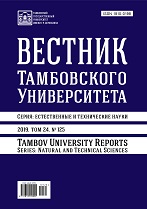|
Scientific articles
Hybrid globalization of convergence of subspace-stabilized sequential quadratic programming method
N. G. Zhurbenkoa, A. F. Izmailovb, E. I. Uskovc
a V. M. Glushkov Institute of Cybernetics of NAS of Ukraine
b Lomonosov Moscow State University
c Derzhavin Tambov State University
Abstract:
Local superlinear convergence of the stabilized sequential quadratic programming method is established under very weak assumptions not involving any constraint qualification conditions. However, all attempts to globalize convergence of this method inevitably face principal difficulties related to the behavior of this method when the iterates are still relatively far from solutions. Specifically, the stabilized sequential quadratic programming method has a tendency to generate long sequences of short steps before its superlinear convergence shows up. To that end, the so-called subspace-stabilized sequential quadratic programming method has been proposed, demonstrating better “semi-local” behavior, and hence, more suitable for development of practical algorithms on its basis. In this work we propose two techniques for hybrid globalization of convergence of this method: algorithm with backups, and algorithm with records.We provide theoretical results on convergence and rate of convergence of these algorithms, as well as some results of their numerical testing.
Keywords:
sequential quadratic programming, degenerate solutions, noncritical Lagrange multiplier, dual stabilization, globalization of convergence.
Received: 26.01.2019
Citation:
N. G. Zhurbenko, A. F. Izmailov, E. I. Uskov, “Hybrid globalization of convergence of subspace-stabilized sequential quadratic programming method”, Russian Universities Reports. Mathematics, 24:126 (2019), 150–165
Linking options:
https://www.mathnet.ru/eng/vtamu143 https://www.mathnet.ru/eng/vtamu/v24/i126/p150
|

| Statistics & downloads: |
| Abstract page: | 101 | | Full-text PDF : | 45 | | References: | 24 |
|




 Contact us:
Contact us: Terms of Use
Terms of Use
 Registration to the website
Registration to the website Logotypes
Logotypes









 Citation in format
Citation in format 